Share
Working at ESO
Are you interested in working in areas of frontline technology and in a stimulating international environment? Do you feel your profile matches our requirements? Learn more about our current vacancies and apply online. Read more..
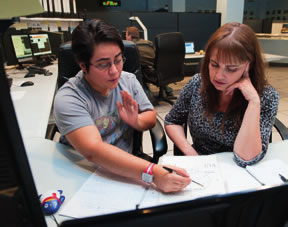
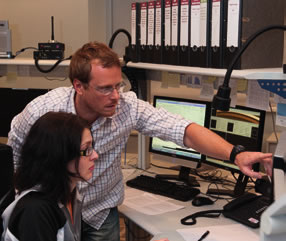

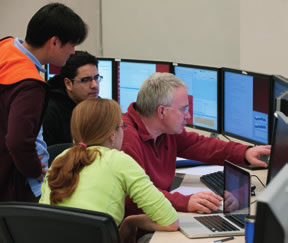
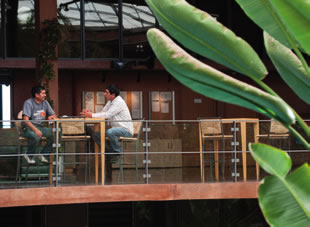

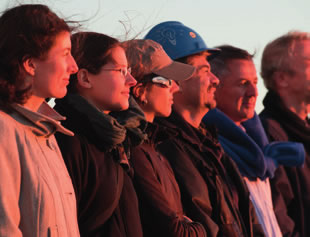

The European Organisation for Astronomical Research in the Southern Hemisphere (ESO) is the foremost intergovernmental astronomy organisation in Europe and the world's most productive ground-based astronomical observatory. ESO carries out an ambitious programme focused on the design, construction and operation of powerful ground-based observing facilities enabling astronomers to make important scientific discoveries. ESO operates three unique world-class observing sites in northern Chile: La Silla, Paranal and Chajnantor (home to ALMA and APEX), and the ESO Headquarters are located in Garching, near Munich, Germany. At Paranal, ESO operates the Very Large Telescope, the world's most advanced visible-light astronomical observatory. ESO is a major partner in ALMA, the largest astronomical project in existence. And on Cerro Armazones, ESO is building the 39-metre European Extremely Large Telescope, which will become the world's biggest eye on the sky and whose operations will be fully integrated into the Paranal Observatory.
For its Directorate for Science at its Headquarters in Garching near Munich, Germany, ESO is advertising the position of
VLTI Programme Scientist
Garching
Deadline 30/04/2016
As part of its Very Large Telescope (VLT) facility on Cerro Paranal in Chile, ESO is operating and further developing the largest astronomical optical interferometer, the VLTI (Very Large Telescope Interferometer). It consists of the combination/array of the four 8.2-m VLT unit telescopes and four 1.8-m mobile Auxiliary Telescopes. Two second- generation instruments, Gravity and Matisse should be operational in 2016 and 2018 respectively.
The VLTI development work is being carried out as part of the La Silla Paranal (LSP) Instrumentation Programme, managed by the Directorate of Programmes in Garching. We are looking for an experienced senior scientist to provide overall scientific leadership of ESO's VLTI Programme.
Main Duties and Responsibilities:
- Inform the Director for Science about VLTI development status, challenges and scientific productivity;
- Provide advice to the LSP Instrumentation Programme Manager to ensure that the necessary design trade-offs made on the Programme are carried out within an appropriate science driven context. Establish clearly the scientific priorities in this context;
- Work closely with the VLTI Instrument Scientist and VLTI Facility Project Manager to ensure that the currently approved VLTI Programme meets its scientific goals;
- Ensure that the VLTI will be scientifically exploited to the best of its capabilities;
- Engage with the community to elaborate ways to increase the user base;
- Continue elaborating, updating and implementing the long-term future of the VLTI. This should be done in close collaboration with the VLT Programme Scientist in the general context of ESO's roadmap;
- Prepare and give briefings to ESO governing bodies and committees as needed.
As a member of the ESO Science Faculty, the VLTI Programme Scientist is expected and encouraged to conduct an active astronomical research programme on a 50/50 basis.
Reports to:
Director for Science
Experience:
You should have an internationally recognised profile in the area of optical/IR interferometry with a minimum of ten years of experience. A strong record of personal research in interferometry science and techniques is essential.
Key Competences:
- Provide scientific vision and leadership to geographically dispersed multi-cultural/multi-disciplinary teams within a cost constrained Programme;
- Work closely with key opinion formers at ESO and in the community to explain the challenges faced by the VLTI and put in place a vision for the future;
- Ability to effectively communicate at all levels within the Organisation and with the community;
- Provide clear, concise and timely oral and written communications, identifying the key issues, examining options and proposing a way ahead.
Qualifications:
Ph.D. in astronomy, physics or equivalent.
Language Skills:
The position requires a good command of the English language. Additional knowledge of other European languages would be an advantage.
Remuneration and Contract:
We offer an attractive remuneration package including a competitive salary (tax free), comprehensive pension scheme and medical, educational and other social benefits, as well as financial support in relocating family members and the possibility to place child/children in daycare.
The contract is for a fixed term duration of three years, and is subject to successful completion of the probation period. There is a possibility of extension(s) subject to individual performance and organisational requirements, and as defined in the applicable policies and staff rules and regulations. For any further information, please visit http://www.eso.org/public/jobs/conditions/intstaff.
Duty Station:
Garching near Munich, Germany
Career Path:
V
Application:
If you are interested in working in areas of frontline technology and in a stimulating international environment, please visit (<http://www.eso.org>) for further details.
Applicants are invited to apply online at <http://jobs.eso.org/>. Applications must be completed in English and should include a motivation letter, CV containing a publication list with a research statement. Also required are the names and contact details of three scientists familiar with your work and willing to provide a recommendation letter. Referees will be automatically invited to submit a recommendation letter. However, applicants are strongly advised to trigger these invitations (using the web application form) well in advance of the application deadline.
Closing date for applications is 30 April 2016
Interviews are expected to start soon after this date.
No nationality is in principle excluded however, recruitment preference will be given to nationals of Austria, Belgium, Brazil, the Czech Republic, Denmark, Finland, France, Germany, Italy, the Netherlands, Poland, Portugal, Spain, Sweden, Switzerland and the United Kingdom.
The post is equally open to suitably qualified female and male applicants.
